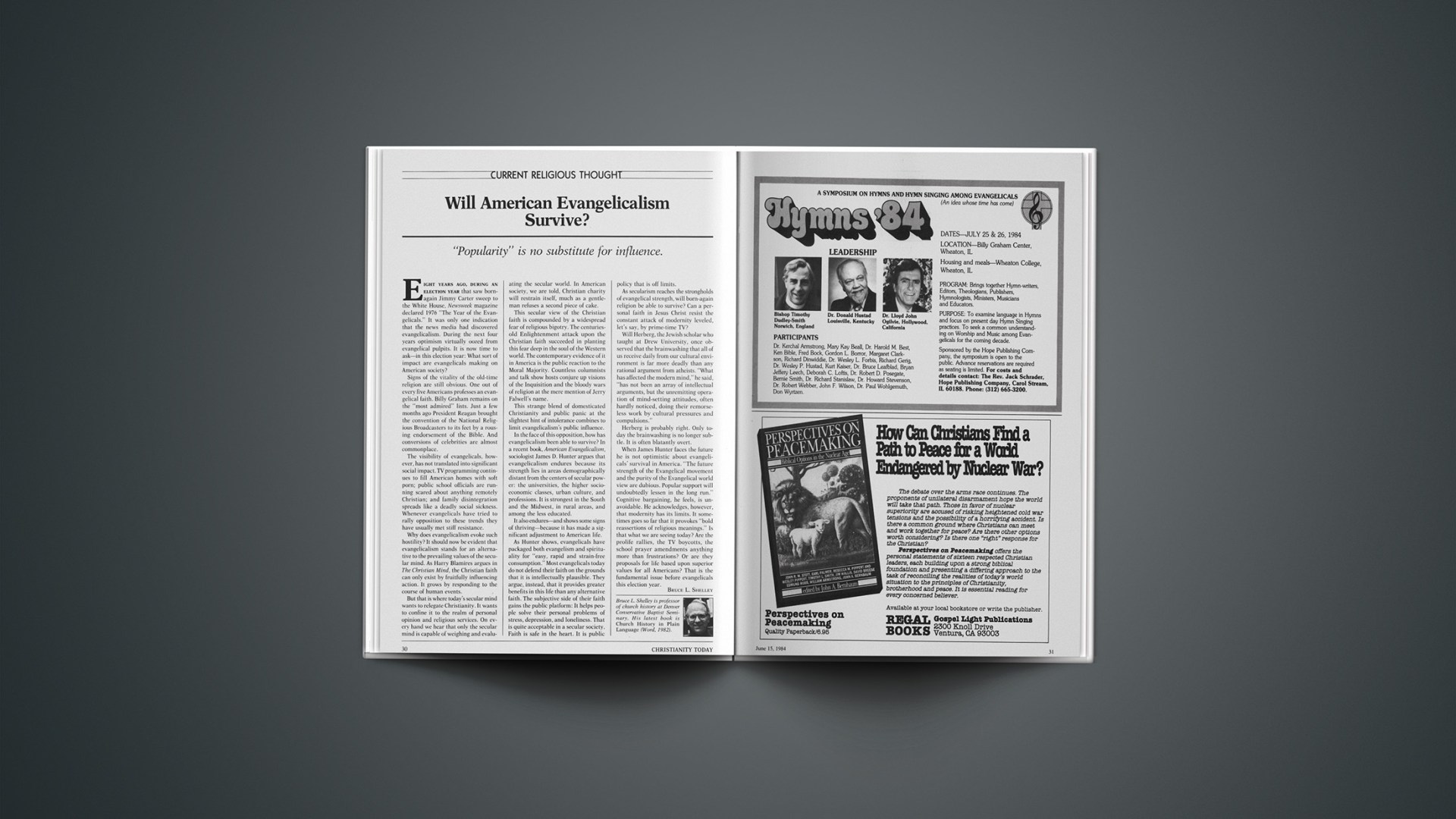“Popularity” is no substitute for influence.
Eight years ago, during an election year that saw born-again Jimmy Carter sweep to the White House, Newsweek magazine declared 1976 “The Year of the Evangelicals.” It was only one indication that the news media had discovered evangelicalism. During the next four years optimism virtually oozed from evangelical pulpits. It is now time to ask—in this election year: What sort of impact are evangelicals making on American society?
Signs of the vitality of the old-time religion are still obvious. One out of every five Americans professes an evangelical faith. Billy Graham remains on the “most admired” lists. Just a few months ago President Reagan brought the convention of the National Religious Broadcasters to its feet by a rousing endorsement of the Bible. And conversions of celebrities are almost commonplace.
The visibility of evangelicals, however, has not translated into significant social impact. TV programming continues to fill American homes with soft porn; public school officials are running scared about anything remotely Christian; and family disintegration spreads like a deadly social sickness. Whenever evangelicals have tried to rally opposition to these trends they have usually met stiff resistance.
Why does evangelicalism evoke such hostility? It should now be evident that evangelicalism stands for an alternative to the prevailing values of the secular mind. As Harry Blamires argues in The Christian Mind, the Christian faith can only exist by fruitfully influencing action. It grows by responding to the course of human events.
But that is where today’s secular mind wants to relegate Christianity. It wants to confine it to the realm of personal opinion and religious services. On every hand we hear that only the secular mind is capable of weighing and evaluating the secular world. In American society, we are told, Christian charity will restrain itself, much as a gentleman refuses a second piece of cake.
This secular view of the Christian faith is compounded by a widespread fear of religious bigotry. The centuries-old Enlightenment attack upon the Christian faith succeeded in planting this fear deep in the soul of the Western world. The contemporary evidence of it in America is the public reaction to the Moral Majority. Countless columnists and talk show hosts conjure up visions of the Inquisition and the bloody wars of religion at the mere mention of Jerry Falwell’s name.
This strange blend of domesticated Christianity and public panic at the slightest hint of intolerance combines to limit evangelicalism’s public influence.
In the face of this opposition, how has evangelicalism been able to survive? In a recent book, American Evangelicalism, sociologist James D. Hunter argues that evangelicalism endures because its strength lies in areas demographically distant from the centers of secular power: the universities, the higher socioeconomic classes, urban culture, and professions. It is strongest in the South and the Midwest, in rural areas, and among the less educated.
It also endures—and shows some signs of thriving—because it has made a significant adjustment to American life.
As Hunter shows, evangelicals have packaged both evangelism and spirituality for “easy, rapid and strain-free consumption.” Most evangelicals today do not defend their faith on the grounds that it is intellectually plausible. They argue, instead, that it provides greater benefits in this life than any alternative faith. The subjective side of their faith gains the public platform: It helps people solve their personal problems of stress, depression, and loneliness. That is quite acceptable in a secular society. Faith is safe in the heart. It is public policy that is off limits.
As secularism reaches the strongholds of evangelical strength, will born-again religion be able to survive? Can a personal faith in Jesus Christ resist the constant attack of modernity leveled, let’s say, by prime-time TV?
Will Herberg, the Jewish scholar who taught at Drew University, once observed that the brainwashing that all of us receive daily from our cultural environment is far more deadly than any rational argument from atheists. “What has affected the modern mind,” he said, “has not been an array of intellectual arguments, but the unremitting operation of mind-setting attitudes, often hardly noticed, doing their remorseless work by cultural pressures and compulsions.”
Herberg is probably right. Only today the brainwashing is no longer subtle. It is often blatantly overt.
When James Hunter faces the future he is not optimistic about evangelicals’ survival in America. “The future strength of the Evangelical movement and the purity of the Evangelical world view are dubious. Popular support will undoubtedly lessen in the long run.” Cognitive bargaining, he feels, is unavoidable. He acknowledges, however, that modernity has its limits. It sometimes goes so far that it provokes “bold reassertions of religious meanings.” Is that what we are seeing today? Are the prolife rallies, the TV boycotts, the school prayer amendments anything more than frustrations? Or are they proposals for life based upon superior values for all Americans? That is the fundamental issue before evangelicals this election year.
Bruce L. Shelley is professor of church history at Denver Conservative Baptist Seminary. His latest book is Church History in Plain Language (Word, 1982).










